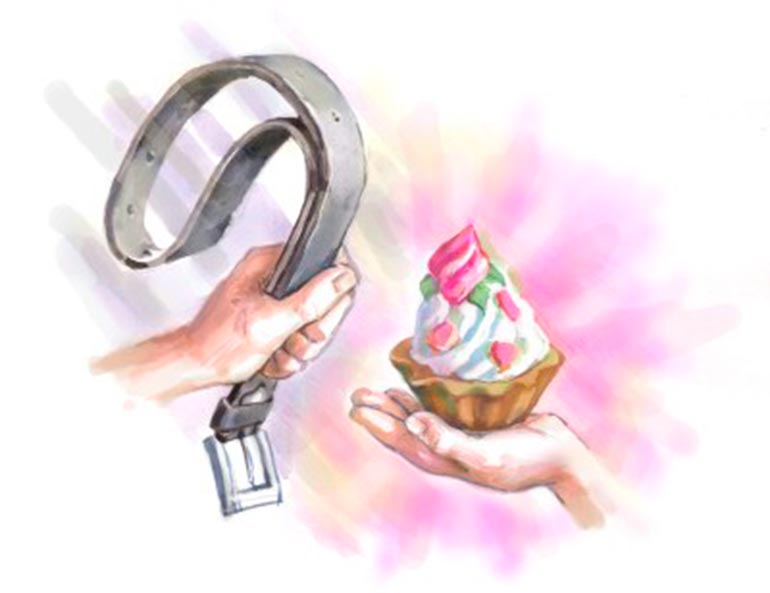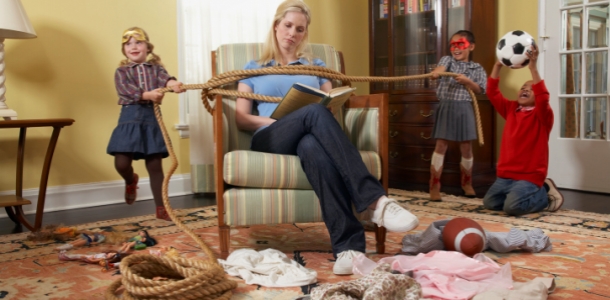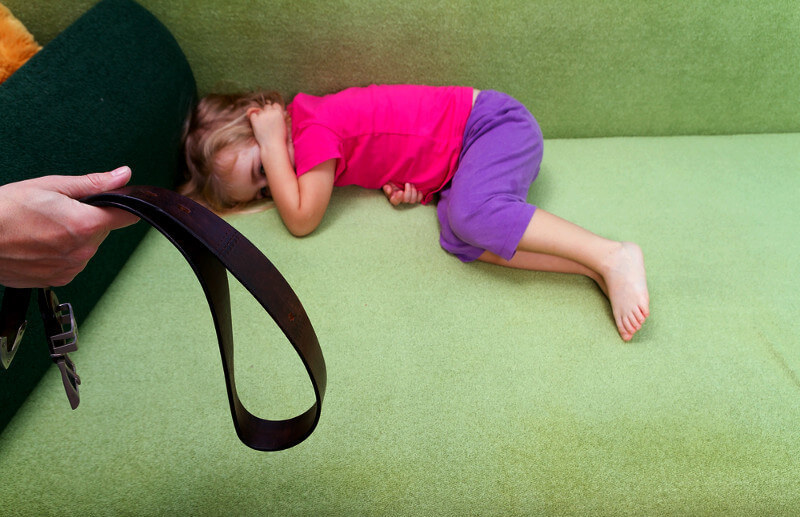Born into the light, a person is a blank sheet. The task of parents is to ensure the safety of the baby, instill in him moral standards and values, create conditions for the full development of the personality. This is not easy to do. After all, as a child grows up, the child begins to show his own individuality, defends his opinion, sometimes is naughty and indulges. One of the most famous and ancient methods of education that parents resort to is the carrot and stick method, or reward and punishment. How effective is it?

Whip method
The whip method is to physically affect the child in order to punish the offense. Many parents can slap a child, hang a slap in the back, put in a corner, and even snap a belt. The purpose of such actions is one - to hurt, show their power over the baby, put in place.
Theoretically, this method can be quite effective. Perhaps the child will stop the negative behavior for fear of pain, prohibitions and privations. However, the child's approved behavior can be demonstrated only in the presence of mom or dad.
Physical punishment has a destructive effect on the psyche of a small person. They undermine confidence in parents, form a fear and resentment for adults. Children who are systematically punished with a “whip” become closed, shy, depressed, learn to lie and dodge.
Upon reaching adolescence, these guys can "rebel" and show negativity in relation to adults. That is, to deny the norms of behavior accepted in society, to proclaim their own anti-values and to follow them.
We read on the topic:
- Why you can not spank a child - 6 reasons -https://kid.htgetrid.com/en/psihologiya-detey/pochemu-nelzya-shlepat-rebenka-6-prichin.html
- To beat or not to beat a child - the consequences of physical punishment of children -https://kid.htgetrid.com/en/psihologiya-detey/bit-ili-ne-bit-rebenka-posledstviya-fizicheskogo-nakazaniya-detey.html
- Is it necessary to punish a child at 3 years: the opinion of parents and a psychologist -https://kid.htgetrid.com/en/psihologiya-detey/nuzhno-li-nakazyivat-rebenka-v-3-goda-mnenie-roditeley-i-psihologa.html
Gingerbread method
The gingerbread method consists in the obligatory promotion of the child for the desired behavior, help, fulfilled assignment. Encouragements are necessary in the process of education, but you also need to be careful with them. There is a danger to teach a baby that a reward awaits him for any positive action.
On the issue of child rewards, it is important to distinguish between two forms of desired behavior. The first is when the baby succeeds in his activities. For example, a one and a half year old child learned to assemble a pyramid. Or a schoolboy independently solved a difficult problem.In these cases, the child himself rejoices at his achievement, a sense of success is for him an internal, automatic encouragement.
At such moments, a little man needs sincere joy, love, empathy for his parents. If adults give a coin for a correctly solved problem, they can pay off their internal satisfaction, replacing it with the expectation of a reward from the outside.
The second form of behavior for which the child must be encouraged is moral behavior. This is the expected behavior of parents and a socially approved course of action, especially in critical situations. After all, a child is not born with moral standards; instilling them is the task of the educator.
We also read: how to encourage a child?
Excessive encouragement of the child harms the formation of his personality. When parents indulge too much, indulge whims, intensively patronize the offspring, he can grow up selfish, spoiled (12 signs of a spoiled child), an infantile person who is not able to independently solve life difficulties.

Reasonable combination of rewards and punishments
So what to do? How to educate a baby so as not to break his psyche with punishment and not spoil it with unnecessary rewards? The answer is one: to find a middle ground, it is reasonable to combine both. And it is imperative to take into account the individual characteristics of the peanut: the approach to the tomboy-playful and closed dreamer will be different.
How to punish a child: rules for parents
- Clearly define what’s allowed. Tell your baby what good behavior is for you and what you cannot do. Say that bad behavior is punished and make it clear what exactly awaits him if he does not obey;
- Follow the sequence. No should always mean no. The child should know that if he violates the ban, a specific punishment will surely await him. Do not allow misconduct fees to depend on the mood of the parents or other circumstances;
- Be united in your requirements. That is, mom and dad, and preferably grandparents should act as one front (a close-knit family will turn a mountain, or how to overcome differences in parenting) Children quickly understand from which ropes can be twisted, and begin to manipulate adults (little manipulators: how to respond to tricks of the child? 10 most successful childhood phrases);
- Punish misconduct accordingly. For the first time, a misdemeanor or minor mischief is worthy of warning only, while intentional misconduct or aggression deserves serious punishment (to punish or not a child for accidental misconduct?);
- Keep calm. When punishing, do not scream, but try to calmly explain to the child what exactly he did wrong and what behavior you expect from him in the future. Pay attention that you don’t like the act, and you are very fond of the little one and are upset when you have to deprive him of something;
- Never take educational actions in a bad mood.
We also read: 8 loyal ways to punish children. How to punish a child for disobedience
Have you often wondered how to punish your child correctly after his leprosy and disobedience? Do you listen to what your parents did in such cases? Whether you were justly punished as a child, and how to punish your own children in order not to injure their psyche, will tell psychologist Julia Ulyanova:
How to encourage a child properly: recommendations for parents
- Praise your child for specific actions. It’s better to say “What order is in the room! Nice to see! ”Than“ Well done! ” about the removed toys;
- Do not reward for natural things. If the offspring himself removed the bed, washed the dishes, do not say “Good girl! You cleaned up after yourself! ". By this we demonstrate disbelief in the self-sufficiency of the child;
- Pay attention to the positive emotions of the babywhich he experienced in achieving success. This will help him analyze his feelings and try to continue to achieve the goal;
- Do not use money as a reward. If you like the idea of material rewards, it is better to give out buttons, coffee beans, etc. And for the agreed number of them you can reward a trip to the circus, to the rides, to the children's center (children and money: 10 mistakes of financial education).
And do not forget that the most effective method is the education of love. When a child feels unconditional love and respect from his parents, punishment and encouragement will be accepted correctly and fall on fertile ground.
Everything should be in moderation - and affection and severity. It’s just that many parents don’t know how to stop at that “golden mean”, where there is no place for either spoiling or assault.
We also read:
- 25 tips for raising a child in love and peace
- 12 easy ways to show your child your love every day
- Top 10 Parent Mistakes in Parenting
Opinions from the forums:
fergie: The whip should be present at first. They didn’t bring them up to five years old, the child did not understand what is good and what is bad - consider, they missed the moment. And if from childhood everything is laid in the head of a child, then you can build communication on just one “carrot”.
Lena: For the first time I hear that at the first stages of a child’s life, a whip should be present. He needs to be explained from the first days of his life, to talk with him, and not to grab the whip. No, of course it’s necessary to scold, I do not argue, but the whip, as for me, is the last thing that can be. If questions will be decided by beating the child, then the further, the more difficult, the child will grow up and will simply hate you.
Zhenya: I agree with the middle ground, although it is incredibly difficult to find. We must try to become a child's friend and authority, so that we don’t be afraid to share with you, to listen, and understand that you are on our side. But he must also be responsible for the misconduct, and he must also understand this.
Dasha:If you constantly scold the child, he will not have an incentive to do something well - why if he is scolded anyway, but in the best case they just will not notice? If you constantly praise, he will grow up spoiled, not accepting criticism. It is necessary to combine 2 methods. The effect is - scold, explain why you scolded - he will know that this is bad (not the first time, of course), did something even if it is insignificant in your opinion - be sure to praise him, he will have an incentive to do something not just good, but better than last time ..
Take care of your children
Do not scold them for pranks.
The evil of their bad days
Never tear them down.
Don't be mad at them seriously
Even if they were guilty,
Nothing is more expensive than tears
What with the cilia of relatives rolled down.
If fatigue knocks down
There is no urine to cope with her
Well, son will come to you
Or a daughter will extend her arms.
Hold them tight
Cherish your child’s affection
Is this happiness? a short moment
Hurry to be happy.
Cause melting like snow in spring
These golden days flashed
And leave the native hearth
Your children have matured.
Leafing through an album
With childhood photos,
With sadness remember the past
About those days when we were together.
How will you want
At this time, return again
So that they can sing a little song,
Cheeks with gentle lips touch.
And while there’s a laugh in the house,
There’s nowhere to go from toys
You are happier than anyone in the world
Take care, please, childhood!
Carrot and stick: about punishment and praise in the process of raising a child










It seems to me that education with the use of force does not give a result. A child should initially see authority in his parents, not a tyrant who can strike for some mistake.